At the 2021 annual meeting of the Southern Baptist Convention (SBC), messengers passed two resolutions regarding the sanctity of human life contra abortion. The first, titled “On Taxpayer Complicity in Abortion and the Hyde Amendment,” was brought to the floor by the Resolutions Committee. The second, titled “Resolution on Abolishing Abortion,” was declined by the Resolutions Committee, because they were already bringing the “Hyde Amendment” resolution, and because they thought some of the language in the “Abolishing” resolution was problematic. Bill Ascol, a pastor from Oklahoma, called for the messengers to bring the “Abolishing” resolution out of committee, so we could vote on it from the floor; this is an unusual move, and it takes a 2/3 vote of the messengers, but it was accomplished.
What Is a Resolution?
Other than electing officers of the Convention, the main votes that messengers cast at the SBC are for resolutions or motions. A resolution is an expression of opinion or concern, in contrast with a motion, which calls for action on the part of the Convention. A resolution is not used to direct an entity of the SBC to any specific action. Rather, a resolution communicates an opinion or concern expressed by the specific group of messengers meeting at the annual Convention during a particular year.
Speaking To or Amending Resolutions
Messengers can speak for or against resolutions, ask questions about the resolutions, or propose an amendment to a resolution. Proposed amendments must be voted upon by the quorum of messengers in the Hall. Interacting with the resolutions in these ways can be somewhat tricky, because only a certain (fairly short) amount of time is allotted for discussion of each resolution; messengers must get to one of the microphones in the Convention Hall, and the chair recognizes messengers at the microphones in the order that buttons attached to the microphones are pressed, on a first-come, first-serve basis. Therefore, for resolutions that have a lot of messengers’ interest, lines can form around each microphone several minutes before the resolution comes up for consideration, and most of the people in those lines never have the opportunity of speaking to the Convention before the vote is called. (This is not a complaint, just a description.)
What I Wanted to Say About the Resolution on Abolishing Abortion
I’ve only ever spoken on a Convention microphone once (to ask a question about another resolution), but I felt strongly about the Resolution on Abolishing Abortion, so I got in line to speak about it (and I filled out the required paperwork early!). I ended up not getting the opportunity to speak before the vote was called. I was intending to call for an amendment to the resolution and then to urge passage of the resolution whether or not the amendment carried. Here’s what I was going to say:
PROPOSED AMENDMENT
I propose that the statement in paragraph 14, “we will not embrace an incremental approach to ending abortion” be amended to “we will not settle for an incremental approach to ending abortion.”
I know some of my friends in favor of this resolution believe that any incremental measures to end abortion are sinful, and I’ve debated them on a personal level—in conversation—on that point.
With those who are bringing this resolution, I agree—and believe we should all agree—that our goal is not for fewer babies to be murdered in the womb; our goal is to see every child—these small image-bearers of God—protected under law from conception. Therefore, I’m proposing we should not “settle for”—as I’m proposing we amend this—an incremental approach as if fewer abortions were our goal.
SPEAKING FOR THE RESOLUTION
I want to thank the Resolutions Committee for the resolution yesterday [Tuesday, June 15] regarding the Hyde Amendment. That resolution was mostly focused on addressing the right-to-life at the federal level and federal monies spent on abortion.
However, we have brothers and sisters working with state legislatures to pass legislation protecting the right-to-life at that level. (I know of some in Texas and Oklahoma in particular.)
Practically speaking, the resolution before us now is both more specific in speaking of the right-to-life and more general in its application concerning Southern Baptists’ commitment for the right-to-life. Therefore, I believe this resolution will be a useful tool in speaking to state legislators and to the press, and I urge its passage.
This Convention has shown a resolve regarding issues of justice. If a resolution comes before the Convention decrying racism in any form, the messengers eagerly pass it. If a resolution comes before the Convention decrying sexual abuse or those who would cover it up, the messengers eagerly pass it.
We do NOT say, “Well, we’ve already passed a resolution on that, we don’t need another one.”
So we should be eager to similarly and abundantly affirm our commitment concerning the right-to-life.
This should be an easy vote YES for us.
I urge the messengers to pass this Resolution on Abolishing Abortion.
Outcome of the Resolution
As the resolution was being discussed, a professor from Midwestern Baptist Theological Seminary and an employee with the SBC’s Ethics and Religious Liberty Commission spoke against the resolution. They were concerned about the language against incrementalism, which I had hoped to amend. Before I could get to the mike, someone else proposed an amendment, adding the word “alone,” so that the statement in paragraph 14 was changed to “we will not embrace an incremental approach alone to ending abortion” (emphasis added). This amendment passed, and it was a fine solution, in my view. When messengers called for the vote on the amendment, they also called for the vote on the resolution itself, so (in a separate vote) that passed as well.
I was happy that the resolution passed. The SBC has had several pro-life resolutions before, but this one was the most robust, with the most scriptural proofs, calling for an immediate end to the murder of the unborn. And I wasn’t upset at all that I didn’t have to face the rather intimidating experience of speaking to the Convention Hall (though I had spent all morning working out what I was going to say 🙂 ).
Text of the Resolution on Abolishing Abortion, as Passed:
Adopted by the SBC annual meeting in Nashville, Tenn., June 16, 2021
WHEREAS, from the moment of fertilization, all humans are created in God’s image by, through, and for Jesus to the glory of God, and all souls belong to Him (Genesis 1:27; 4:1; 21:2; Isaiah 7:14; Colossians 1:16; Romans 11:36; Ezekiel 18:4), and
WHEREAS, as God’s image-bearers, all humans both display His divine worth, power, and attributes, and possess equal, objective worth before God, not varying based on incidental characteristics; such as ethnicity, age, size, means of conception, mental development, physical development, gender, potential, or contribution to society (Rom 1:19-20; Gen 1:27; 9:6; Matthew 18:6), and
WHEREAS, to murder any preborn image-bearer is a sin, violating both the natural law of retributive justice as set forth in the Noahic covenant, as well as the sixth commandment forbidding murder, and as such, is ultimately an assault on God’s image, seeking to usurp God’s sovereignty as Creator (Gen 9:5-6; Exodus 20:13; Proverbs 6:17), and
WHEREAS, God’s Word declares that all human life is a sacred gift and that His Law is supreme over man’s life and man’s law (Psalm 127:3-5; 139:13-16; Rom 2:15-16; Acts 10:42; 17:31; 1 Corinthians 4:5), and
WHEREAS, God commands His people to “rescue those who are being taken away to death” and holds them responsible and without excuse when they fail to do so (Prov 24:11-12), and
WHEREAS, God establishes all governing authorities as His avenging servants to carry out His wrath on the evildoer, and commands these authorities to judge justly, neither showing partiality to the wicked, nor using unequal standards, which are abominations (Psa 82; Prov 20:10; Rom 13:4), and
WHEREAS, in 1973, the Supreme Court of the United States rendered an iniquitous decision on Roe v. Wade, and in doing so deprived the innocent of their rights, and usurped God, who sovereignly ordained their authority (Isa 5:23; 10:1-2; Psa 2; Matt 22:21; John 19:11; Acts 4:19; 5:29, Rom 13:1), and
WHEREAS, in the Roe v. Wade decision, the Supreme Court of the United States subverted the U.S. Constitution namely, the Preamble, as well as the Fifth and Fourteenth Amendments without any legal authority (Article 6, Clause 2 “Supremacy Clause”), and
WHEREAS, governing authorities at every level have a duty before God to uphold justice asserting their God-ordained and constitutional authority to establish equal protection under the law for all, born and preborn, by intervening, ignoring, or nullifying iniquitous decisions when other authorities, such as the Supreme Court, condone such injustices as the legal taking of innocent life (Daniel 3; 1 Kings 12; 2 Kings 11; Jeremiah 26:10-16; 36:9-31; 37:11- 21; 39:7-10), and
WHEREAS, over the past 48 years with 60+ million abortions, traditional Pro-life laws, though well intended, have not established equal protection and justice for the preborn, but on the contrary, appallingly have established incremental, regulatory guidelines for when, where, why, and how to obtain legal abortion of innocent preborn children, thereby legally sanctioning abortion, and
WHEREAS, since 1980, the SBC has passed many resolutions reaffirming the importance of human life at all stages of development, but we have yet to call for the immediate abolition of abortion without exception or compromise, and
WHEREAS, our confessional statement, The Baptist Faith and Message, according to Article XV, affirms that children “from the moment of conception, are a blessing and heritage from the Lord”; and further affirms that Southern Baptists are mandated by Scripture to “speak on behalf of the unborn and contend for the sanctity of all human life from conception to natural death,” now, be it therefore
RESOLVED, that the messengers of the SBC meeting in Nashville, Tennessee, June 15-16, 2021, do state unequivocally that abortion is murder, and we reject any position that allows for any exceptions to the legal protection of our preborn neighbors, compromises God’s holy standard of justice, or promotes any God-hating partiality (Psa 94:6; Isa 10:1-2; Prov 24:11; Psa 82:1-4), and be it further
RESOLVED, that we will not embrace an incremental approach alone to ending abortion because it challenges God’s Lordship over the heart and the conscience, and rejects His call to repent of sin completely and immediately (Gen 3:1; John 8:44; Rom 2:14-15; 2 Corinthians 11:3), and be it further
RESOLVED, that we affirm that the murder of preborn children is a crime against humanity that must be punished equally under the law, and be it further
RESOLVED, that we humbly confess and lament any complicity in recognizing exceptions that legitimize or regulate abortion, and of any apathy, in not laboring with the power and influence we have to abolish abortion, and be it further
RESOLVED, that as Southern Baptists we will engage, with God’s help, in establishing equal justice and protection for the preborn according to the authority of God’s Word as well as local and federal law, and call upon pastors and leaders to use their God-given gifts of preaching, teaching, and leading with one unified, principled, prophetic voice to abolish abortion, and be it finally
RESOLVED, that, because abolishing abortion is a Great Commission issue, we must call upon governing authorities at all levels to repent and “obey everything that [Christ] has commanded,” exhorting them to bear fruit in keeping with repentance by faithfully executing their responsibilities as God’s servants of justice, and working with all urgency to enact legislation using the full weight of their office to interpose on behalf of the preborn, abolishing abortion immediately, without exception or compromise (Mark 6:18; Matt 28:18-20; Rom 13:4, 6).


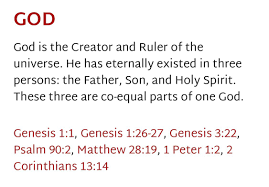



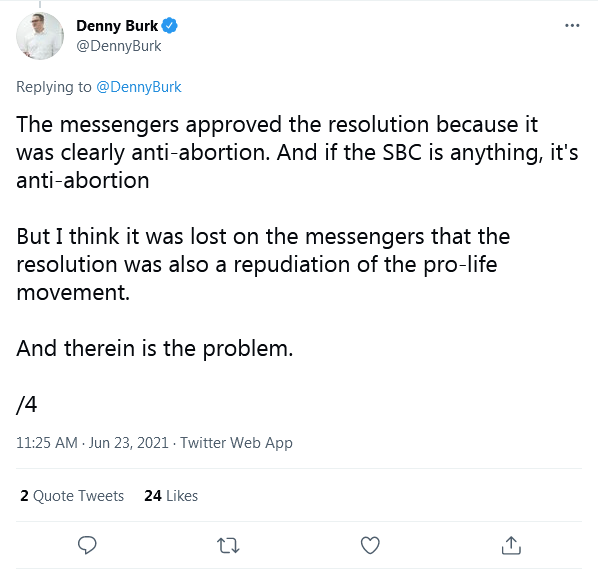

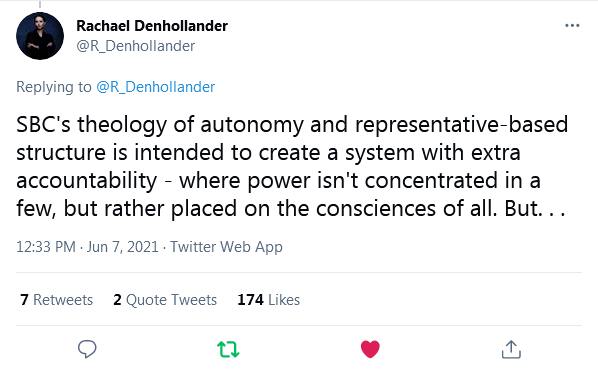
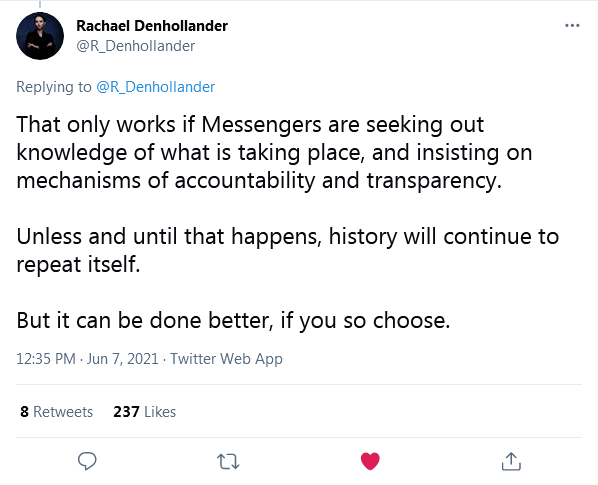
 leaving the Southern Baptist Convention. (See here:
leaving the Southern Baptist Convention. (See here: 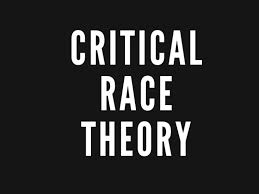

Recent Comments